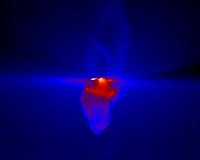 |
Los Angeles CA (SPX) Mar 17, 2010 A new infrared image from NASA's Wide-field Infrared Survey Explorer, or WISE, shows a cosmic rosebud blossoming with new stars. The stars, called the Berkeley 59 cluster, are the blue dots to the right of the image center. They are ripening out of the dust cloud from which they formed, and at just a few million years old, are young on stellar time scales. The rosebud-like red glow surrounding the hot, young stars is warm dust heated by the stars. Green "leafy" nebulosity enfolds the cluster, showing the edges of the dense, dusty cloud. This green material is from heated polycyclic aromatic hydrocarbons, molecules that can be found on Earth in barbecue pits, exhaust pipes and other places where combustion has occurred. Red sources within the green nebula indicate a second generation of stars forming at the surface of the natal cloud, possibly as a consequence of heating and compression from the younger stars. A supernova remnant associated with this region, called NGC 7822, indicates that a massive star has already exploded, blowing the cloud open in a "champagne flow" and leaving behind this floral remnant. Blue dots sprinkled throughout are foreground stars in our Milky Way galaxy. Berkeley 59 and NGC 7822 are located in the constellation of Cepheus at a distance of about 3,300 light-years from Earth. Infrared light is color coded in this picture as follows: blue shows 3.4-micron light; cyan, 4.6-micron light; green, 12-micron light; and red, 22-micron light.
Share This Article With Planet Earth
Related Links Wide-field Infrared Survey Explorer Stellar Chemistry, The Universe And All Within It
 Simulations Solve A 20-Year-Old Riddle
Simulations Solve A 20-Year-Old RiddleNew York NY (SPX) Mar 17, 2010 New York NY (SPX) Mar 17, 2010 The birth of the most massive stars - those ten to a hundred times the mass of the Sun - has posed an astrophysical riddle for decades. Massive stars are dense enough to fuse hydrogen while they're still gathering material from the gas cloud, so it was a mystery why their brilliant radiation does not heat the infalling gas and blow it away. New simulations b ... read more |
|
| The content herein, unless otherwise known to be public domain, are Copyright 1995-2010 - SpaceDaily. AFP and UPI Wire Stories are copyright Agence France-Presse and United Press International. ESA Portal Reports are copyright European Space Agency. All NASA sourced material is public domain. Additional copyrights may apply in whole or part to other bona fide parties. Advertising does not imply endorsement,agreement or approval of any opinions, statements or information provided by SpaceDaily on any Web page published or hosted by SpaceDaily. Privacy Statement |